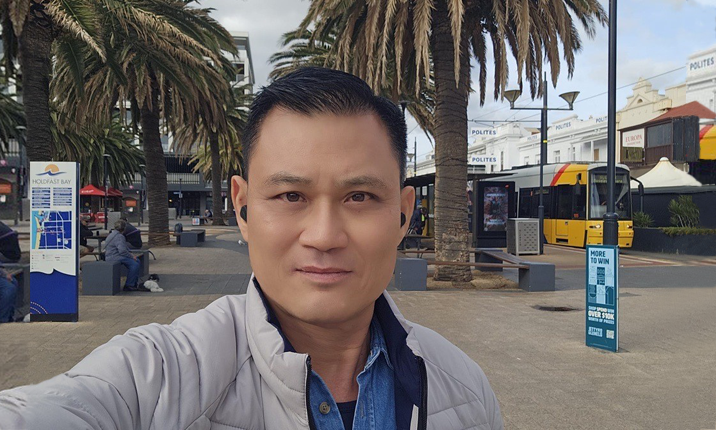-
-
Featured Care Areas


He Thought Only Smokers Got Lung Cancer – Until He Was Diagnosed
Last updated: Monday, June 23, 2025 | 6 min reading time
After a colleague was diagnosed, Leung Wing Wah went for a lung screening, only to discover he had cancer too. He was treated by Dr Su Jang Wen at Gleneagles Hospital.
When a colleague known for his healthy lifestyle was unexpectedly diagnosed with stage 4 lung cancer , the news came as a sobering reminder to everyone at the investment management company where 60-year-old Leung Wing Wah worked.
It prompted many, including Mr Leung, to go for health screenings, suddenly aware that lung cancer could affect even those who seemed to be in good health.
Mr Leung, then general counsel at an investment management company in Singapore, never considered himself at risk. A non-smoker with no family history of lung disease, he exercised regularly and followed a balanced diet. But the health screening led to an unexpected discovery: stage 1 lung cancer.
A hidden threat uncovered
During his health check-up, Mr Leung underwent a routine chest X-ray, which revealed a dark spot in the right cavity of his chest. To investigate further, his doctor recommended a low-dose computed tomography (LDCT) scan — an imaging technique that provides detailed cross-sectional images of the lungs. The results confirmed the presence of a small malignant tumour.
Dr Su Jang Wen, a cardiothoracic surgeon at Gleneagles Hospital, explains the significance of such screenings. “Low-dose CT is sensitive and can detect nodules as small as four or five millimetres, sometimes even down to one or two millimetres,” says Dr Su.
“They can identify potential tumours at their earliest stages, often before symptoms become apparent. In Mr Leung’s case, the scan revealed stage 1 lung cancer with a tumour measuring 1.8cm. Dr Su explains stage 1 lung cancer offers the best prognosis, as the tumour is still small and has not spread to lymph nodes or other organs.
“But for screening to be cost-effective, we must carefully consider which groups of patients will benefit the most. There’s always a balance: if we screen too broadly, we risk over-investigating and causing unnecessary anxiety. But if we don’t screen enough, we may miss early-stage cancers that could have been treated effectively,” Dr Su explains.
From diagnosis to surgery in a week
Mr Leung received his diagnosis within a couple of days of his screening. “It took a while for the news to sink in,” he says.
Given the early stage of his cancer, surgery was recommended.
“Lung cancer at stage 1 is often highly treatable with surgery alone,” explains Dr Su. Mr Leung underwent a lobectomy seven days after his diagnosis, during which one-third of his lung was removed to ensure all cancerous tissue was excised.
A new lease on life
Despite a 15% reduction of his lung capacity, Mr Leung, who is an avid squash player and regular jogger, recovered well.
Mr Leung says he is sharing his story not to frighten people, but to give hope, and to show why regular health checks matter. "One simple scan can make all the difference," he says. "If my colleague's diagnosis hadn't prompted me to get checked, my story might have ended very differently."
He continues to prioritise his health with regular follow-ups and an active lifestyle. "I don't take anything for granted anymore," he says. "Health is unpredictable. Screening made a difference for me, and it could be for others, too."
Why early detection makes the difference
Lung cancer remains one of the most serious health challenges in Singapore. According to the Singapore Cancer Registry Annual Report 2022, over 9,200 cases were diagnosed between 2018 and 2022, making it the third most common cancer among both men and women.
One of the key challenges with lung cancer is that it often develops silently. Symptoms such as persistent cough, chest pain, or breathlessness typically emerge only in more advanced stages, which makes early detection all the more critical.
“The survival rate drops by 30% to 40% between stages 1 and 2,” says Dr Su.
While stage 1 lung cancer has a 5-year survival rate of about 65%, the early form (stage 1A1) can be cured in more than 92% of cases, according to the American Cancer Society. In contrast, survival rates for stage 4 disease remain in the single digits despite medical advances. This is where LDCT scans come in.
“An LDCT scan can help identify lung cancer at an earlier, more treatable stage,” says Dr Su. It is sensitive, and capable of detecting nodules as small as four or five millimetres — and sometimes even smaller — making it far more effective than a standard chest X-ray.
While LDCT scans are more expensive than chest X-rays, Mr Leung feels the cost is justified by the accuracy and peace of mind they provide.
Dr Su agrees, pointing to studies showing that LDCT screening can reduce lung cancer mortality by detecting tumours when they are still operable. For individuals at higher risk, such as smokers or those with a family history of cancer, screening can be particularly beneficial.
Radiation exposure is a common concern, but Dr Su clarifies that LDCT uses about 20% of the radiation dose of a standard chest CT while still producing clear images.
“This lower level of exposure may help make the screening more acceptable to a wider group of people,” he adds. In private hospitals in Singapore, the cost of an LDCT scan is typically around $300, though this can vary.
Lung cancer: Not just a smoker’s disease
Lung cancer is often associated with smoking, but as Dr Su points out, a significant number of cases occur in people who have never smoked.
“We are seeing an increasing number of lung cancer diagnoses in non-smokers, particularly in Asia,” says Dr Su. Environmental factors, genetic predisposition, air pollution, and second-hand smoke exposure can all contribute to the development of lung cancer, he explains.
Mr Leung’s case illustrates this point. Despite never having smoked, he was surprised by his diagnosis — highlighting that lung cancer can occur even in individuals without the traditional risk factors commonly associated with the disease.
Currently, Singapore has no standardised lung cancer screening programme for non-smokers. However, interest in the role of LDCT scans is growing, especially in regions where lung cancer rates among non-smokers are on the rise. Researchers continue to explore how to balance early detection with factors such as cost, access, and the potential for unnecessary testing in lower-risk groups.
Mount Elizabeth Cancer Care: Possible Starts Today
At Mount Elizabeth, our expert team of cardiothoracic surgeons, oncologists, and radiation specialists offer comprehensive cancer care. If you have lung health concerns, we are here to help.
Make an appointment








